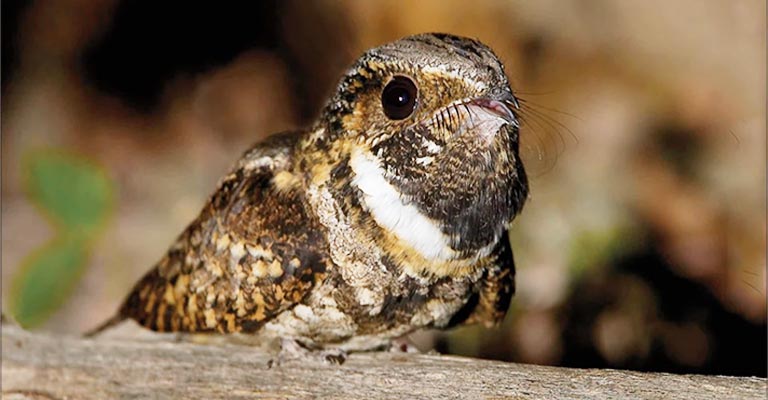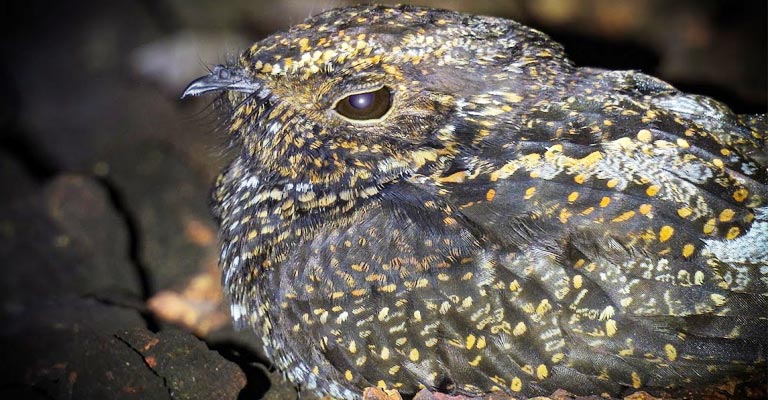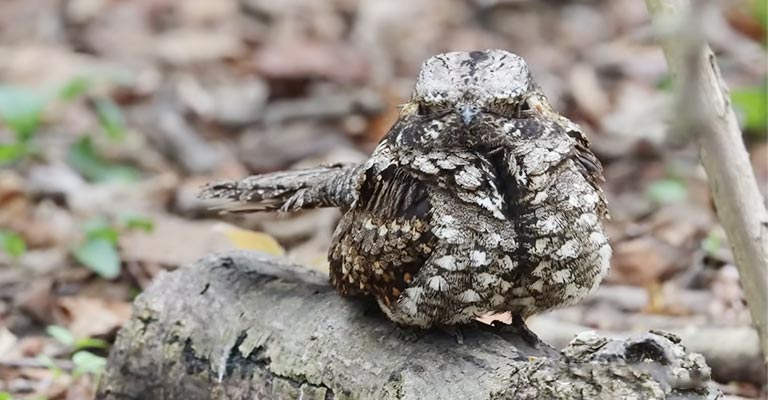The hauntingly beautiful call of the whippoorwill has intrigued and captivated night owls and nature enthusiasts for generations.
As the sun sets and darkness envelopes the landscape, these enigmatic birds awaken, filling the night air with their repetitive and mesmerizing song.
But what motivates the whippoorwill to sing in the cover of darkness? In this article, we venture into the world of these nocturnal songsters to unravel the mystery of why do whippoorwills sing at night.
From their hidden perches, whippoorwills unleash a chorus that echoes through forests and fields, evoking a sense of mystery and solitude.
Join us on a journey to discover the fascinating reasons behind the whippoorwill’s nocturnal serenades, shedding light on the hidden world of these elusive birds that sing under the shroud of darkness.

Why Do Whippoorwills Sing at Night?
One of the primary reasons whippoorwills sing at night is to attract a mate and establish territories.
During the breeding season, which typically occurs in late spring and early summer, male whippoorwills use their calls as a means of advertising their presence and fitness to potential mates.
The characteristic “whip-poor-will” song acts as a vocal display, conveying information about the singer’s health and vigor. Females are known to select mates based on the quality of their songs.
Communication
In addition to attracting mates, whippoorwills use their calls to communicate with one another. Their songs are not limited to courtship and territory establishment but are also a form of social communication.
Males and females engage in duets during the breeding season, with each partner contributing its distinctive vocalizations. These duets help maintain pair bonds and coordinate activities within the breeding pair.
Navigation
Whippoorwills are night hunters, and their vocalizations serve as a form of echolocation or auditory navigation. By emitting their calls, they can detect the locations of other whippoorwills and potential prey in the darkness.
This adaptation allows them to move efficiently through the forested and often dimly lit habitats where they forage for insects, their primary food source.
Territorial Defense
Whippoorwills are known to be territorial birds. Their songs not only serve as a means of establishing territories but also play a role in defending them.
Male whippoorwills vigorously defend their territories from other males by vocalizing and engaging in physical confrontations. The distinct calls help deter intruders and signal boundaries to other birds of the same species.
Masking Ambient Noise
Singing at night provides whippoorwills with the advantage of masking ambient noise. Diurnal birds often face the challenge of competing with various daytime sounds, making it more challenging for their calls to stand out.
Whippoorwills, on the other hand, sing when many other animals are silent, which allows their songs to carry over greater distances and be more effective in attracting mates and establishing territories.
Avoiding Predators
Whippoorwills are cryptic birds that rely on camouflage and remain inconspicuous during daylight hours. Singing at night, when they are most active, allows them to avoid daytime predators such as hawks, owls, and other birds of prey.
It also minimizes the risk of attracting the attention of potential predators while they are relatively stationary during vocalizations.
Tradition and Repetition
Whippoorwills are known for their consistent and repetitive calls, with each “whip-poor-will” phrase following a regular cadence. This repetition has become a defining characteristic of these birds.
It is believed that the traditional and predictable nature of their calls helps reinforce their territorial and social status within their habitat.
Cultural Significance
Whippoorwills have made a significant impact on human culture and folklore. Their nighttime serenades have been featured in literature, music, and oral traditions.
In some cultures, the whippoorwill’s call is considered an omen, associated with good or bad luck. This cultural significance further underscores the fascination and intrigue surrounding these birds.
Is A Whippoorwill A Night Bird?

The whippoorwill is indeed a night bird. In fact, it is often referred to as a nocturnal or crepuscular bird, meaning that it is most active during the night and the twilight hours of dawn and dusk.
The whippoorwill’s nocturnal habits are a key part of its biology and behavior, and they are intricately linked to its survival, reproduction, and ecological role.
Nocturnal Behavior
Whippoorwills are known for their nocturnal behavior, which means that they are primarily active during the night. They are well adapted to low-light conditions and have evolved to take advantage of the darkness.
Their nocturnal habits are influenced by a variety of factors, including predation pressure, foraging opportunities, and environmental conditions.
Predation Avoidance
One of the main reasons whippoorwills are active at night is to avoid daytime predators. Whippoorwills are relatively small birds, and they are vulnerable to a range of diurnal (daytime) predators, including hawks, owls, and other raptors.
By being active at night, when many of these predators are less active or resting, whippoorwills can reduce their risk of being detected and attacked.
Camouflage and Cryptic Coloration
Whippoorwills have excellent camouflage and cryptic coloration that helps them blend into their surroundings during the day.
Their plumage is mottled with shades of brown, gray, and black, allowing them to disappear into the leaf litter and understory of the forests and woodlands where they reside. This cryptic coloration aids in avoiding visual detection by predators.
Foraging Opportunities
The darkness of the night provides whippoorwills with valuable foraging opportunities. These birds are insectivorous, and their primary food source consists of nocturnal insects such as moths, beetles, and other flying insects that are active after dark.
By being active at night, whippoorwills can exploit this abundant and often overlooked food resource.
Auditory Navigation
Whippoorwills have highly developed auditory navigation skills. They use their keen hearing to locate prey in the dark.
Their distinctive calls are not only for mate attraction and territory establishment but also for echolocation, helping them identify the locations of both prey and other whippoorwills in their vicinity.
Reproductive Activity
During the breeding season, which typically occurs in late spring and early summer, whippoorwills become more vocal and active at night. Males sing to attract potential mates and establish territories, while females also contribute to the vocalizations.
The darkness of the night provides a relatively quiet and undisturbed backdrop for these courtship rituals, allowing the songs of the whippoorwills to carry over greater distances.
Seasonal Variations
While whippoorwills are primarily nocturnal birds, their activity levels can vary with the seasons. They are more active and vocal during the breeding season when the need to attract mates and establish territories is at its peak.
Outside of the breeding season, their calls become less frequent, and they may be quieter during the night.
What Does Whippoorwill Symbolize?

The whippoorwill, a bird renowned for its nocturnal habits and distinctive call, has held a place in the folklore, literature, and cultural symbolism of various societies for centuries.
The whippoorwill’s symbolism is often rich and multifaceted, with interpretations that vary across different cultures and regions.
Loneliness and Solitude
In many cultures, the whippoorwill is associated with themes of loneliness and solitude.
Its mournful and repetitive call, often heard in the quiet of the night, has inspired tales and legends of individuals who find themselves alone and isolated. The whippoorwill’s call can evoke feelings of melancholy and introspection.
Omen of Death
In some traditions, the whippoorwill’s call is considered an omen of death. It is believed that hearing the call of a whippoorwill near one’s home or in the vicinity of a sick or dying person can foretell an impending death.
This association with death has contributed to the bird’s eerie reputation in some cultures.
Mourning and Grief
The whippoorwill’s mournful call is often linked to themes of mourning and grief. Its persistent and sorrowful song has been featured in literature and music as a symbol of the pain and loss associated with death and separation.
In some cultures, the whippoorwill’s call is seen as a reminder of the inevitability of mortality.
Cultural Significance
The whippoorwill holds cultural significance in many Indigenous American communities. For some Native American tribes, the bird is viewed as a symbol of protection and healing.
Its presence and vocalizations are believed to offer guidance and comfort to those in need. The whippoorwill is seen as a guardian spirit in these traditions.
Storytelling and Folklore
Whippoorwills have often appeared in stories, folklore, and superstitions. They are frequently featured in tales that explore themes of the supernatural, the unknown, and the mysterious. The bird’s night-time habits and haunting call make it a fitting character in such narratives.
Ambiguity and Mystery
The whippoorwill’s nocturnal nature and elusive behavior contribute to its association with ambiguity and mystery. Its presence at night, when many other creatures are silent, adds to the sense of enigma surrounding the bird.
The whippoorwill’s call can be seen as a reminder of the hidden and unseen aspects of the natural world.
Symbol of Resilience
In some interpretations, the whippoorwill is seen as a symbol of resilience. Despite its solitary and nocturnal lifestyle, it continues to sing through the night, maintaining its presence in the darkness.
This resilience in the face of challenges can serve as an inspirational metaphor for human endurance.
FAQs
What is the origin of the belief that the whippoorwill’s call is an omen of death?
The belief that the whippoorwill’s call is an omen of death likely has its origins in the bird’s nocturnal habits and the eerie quality of its repetitive call.
Are there any positive symbolic interpretations of the whippoorwill’s call?
Yes, in some Indigenous American cultures, the whippoorwill is viewed as a positive symbol. It is considered a guardian spirit that offers protection and healing.
How has the whippoorwill been portrayed in literature and art?
The whippoorwill has been a recurring theme in literature and art, often portrayed in various ways. Its haunting call and nocturnal habits have inspired works that explore themes of solitude, mystery, and the supernatural.
Is the whippoorwill’s symbolism consistent across different cultures?
The symbolism of the whippoorwill varies across different cultures and regions. While some cultures associate it with themes like death and solitude, others see it as a symbol of protection, healing, and renewal.
Why is the whippoorwill often associated with the night and darkness?
The whippoorwill is often associated with night and darkness due to its nocturnal behavior. It is primarily active during the night and the twilight hours of dawn and dusk.
Conclusion
The nocturnal songs of the whippoorwill, though haunting and mysterious, serve multiple purposes in their lives, making them even more fascinating creatures.
While their distinctive calls are indeed used for mate attraction and territory establishment, they also play a vital role in communication and navigation, painting a complex picture of their existence.
In the stillness of the night, the whippoorwill’s song serves as a melodious thread that weaves through their community, enabling them to convey crucial information.
As we continue to unravel the mysteries of the natural world, the whippoorwill’s songs in the night remain a symbol of the wonders that await us in the darkness.
They offer a connection to the hidden and enchanting aspects of the animal kingdom, reminding us that the true beauty of nature often lies beyond the boundaries of daylight.
The whippoorwill’s calls beckon us to explore the enigmatic and magical world that exists under the cloak of the stars, encouraging us to appreciate the subtle complexities of the creatures that thrive in the shadows.